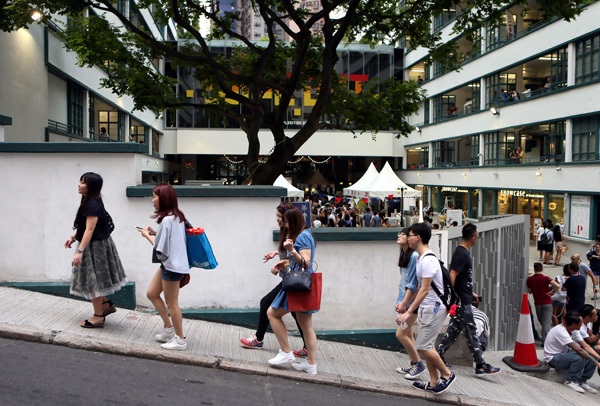City's young creatives look to build a high-tech future
 |
|
Students walk past PMQ, an incubator for Hong Kong's burgeoning creative industry.[Photo/Xinhua] |
The authorities are providing premises and funding for a range of startups in expectation of future success, as Yang Wanli reports.
In May, Zhang Feifei traveled to Hong Kong for the first time. The 24 year old was one of millions of people from the Chinese mainland who visit the city every year, but unlike many travelers who follow the regular tourist routes, Zhang chose PMQ-a hub that serves the city's evolving creative industry-as her first stop.
As a recent graduate of Sichuan University's College of Art in Chengdu, the provincial capital, Zhang is interested in the ideas and work of new designers, most of whom are her peers.
"I wanted my trip to be unique, with a taste of the real, modern Hong Kong," she said. "My parents visited the city as part of a travel group 12 years ago, and their main purpose was shopping, like many other travelers back then. But in recent years, many of my friends have traveled here to explore different things, such as art and fashion."
Built in 1951 as the Police Married Quarters, PMQ was preserved by the city government as a site for the creative industry, and the compound has now developed into a hub to help startups transform creativity into business.
"I love working here, together with many young people who hold the same passion for making our future creative," said Micky Gangwani, head of events at Brinc, an internet of things accelerator in PMQ.
Hong Kong-born, but with Indian heritage, Gangwani said PMQ is a good combination of people and their cultures: "It's a mix of old and new, just like Hong Kong is now experiencing from being a colony to a region with fresh blood and vitality."
The compound is home to about 100 startups, from technology to art and design, and Gangwani said the small businesses are always happy to help each other: "If we have problems with product design or marketing, we turn to other teams in the building for help, just like a family."
Although he can speak a few sentences in Cantonese, Gangwani has become aware of the importance of learning Mandarin because China has developed dramatically in the past decade and his company is closely connected with partners in the mainland.
"We have offices in Shanghai and Guangzhou (Guangdong province). I go to the mainland every month. China is important for the world. Everything in the world is made in China. I think Hong Kong can be a good bridge between the mainland and the world, which also means good opportunities for us," he said.

























